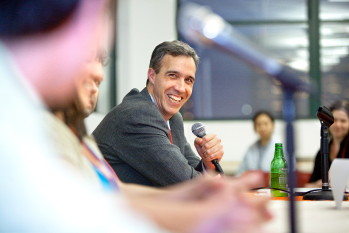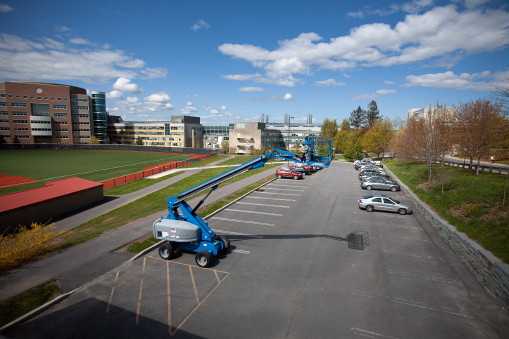YOUR IMPACT
Down to the wire, 39 individuals make Cornell's 'Information Age' facility possible
Faced with the unusual challenge of raising $15 million by the end of 2010 for a new 100,000-square-foot academic facility, Daniel Huttenlocher, dean of the Faculty of Computing and Information Science (CIS), began a whirlwind development effort to make it a reality.

Daniel Huttenlocher, dean of Cornell's Faculty of Computing and Information Science, speaks at "Inside Etsy," an event about the company and the New York City tech scene, held at Etsy's Brooklyn headquarters in April. It was hosted by CIS and the Cornell Entrepreneur Network. See larger image
Funded in part by a $25 million grant from the Bill & Melinda Gates Foundation in 2006, the facility would house 50 computer science and information science professors, the work of 500 students, and their combined research and study of such topics as networks, computing and machine learning, and the way these intersect with about 25 other academic departments. It would bring together, for the first time, departments now scattered among three buildings and provide a home for CIS, which celebrated its 10th anniversary as a unique, college-level unit last year.
CIS and, indeed, the new building it needed to fund, represent what Huttenlocher calls "Cornell's academic leadership in developing an understanding of this new information-rich world, which is causing a fundamental change in the way people live every day." He explains that "it's all so new and changing so quickly that we don't even know what to call many of these profound changes in our lives, but when revolutionary changes like this occur, practice can get ahead of understanding."
Unaccustomed to raising money – he had been a dean for less than a year – Huttenlocher realized that he would feel more comfortable asking others for support if he were a donor himself, and so he pledged $100,000 to the cause (including matching funds from the MacArthur Foundation, of which he is a trustee).
In June, Cornell trustee emeritus Ann Bowers '59, who had on numerous occasions helped the university launch new initiatives, offered $1 million in matching funds for Gates Hall gifts of $100,000 to $250,000, to spur new giving.
With only six months in which to raise $15 million, the university created an initial list of likely donors, including 45 individuals, one public agency, four foundations and seven corporations. Between May 27 and Nov. 30 last year, Huttenlocher and his newly hired director of development Jessica Traynor spent most of their time on the road.
"We just told the story. No proposals, no floor plans," Traynor says. "We talked about what was going to be happening inside the building."
What would be happening would be at the vanguard of the Information Age itself – brand-new collaborations between social scientists and computer scientists, valuable decoding of new behaviors, new systems, and new institutions and industries born of technological advances.

Hoy north parking lot at Hoy and Campus roads is the site for the future William H. Gates Hall, which is expected to be completed in April 2014. In this view, facing west, Hoy Field is visible at left and Rhodes and Upson halls are in the background.
The approach worked surprisingly well. Meeting after meeting resulted in generous donations from people who were excited by CIS's major research accomplishments and its growing importance to undergraduate education for students in all the colleges.
Two months before the deadline, and with fundraising still $6 million short, Provost Kent Fuchs knew the goal would not be met at the current pace, and so he placed a call to presidential councillor David Duffield '62, founder of PeopleSoft and co-founder of Workday. Duffield generously offered $5 million, at last putting the university within reach of its goal.
Now a total of $14.1 million had been raised from 37 donors, including alumni of all ages, current students, parents and even people who hadn't been asked. Fifteen non-executive Microsoft employees came together to give more than $100,000. Daniela Retelny '11, a CIS student who will be pursuing a Ph.D. at Stanford next fall, helped convince her parents, Gary and Angela, to make a gift naming a conference room in the new building. Incredibly, most of the people solicited, even those who had never before made a major gift (or any gift at all) to Cornell, said yes, with their gifts ranging from $100 to Duffield's $5 million.
On Nov. 19 presidential councillor John Alexander '74 and his wife, Elaine '77, contacted the university. "Cornell provided me with a great head start as I began my company (CBORD) while a student in Ithaca," John wrote in an e-mail. "Over the years, we hired literally hundreds of Cornell grads, not to mention scores of interns, many of whom were studying in earlier incarnations of the current program in Computing and Information Science. So it makes sense, as Cornell approaches this landmark project, to help get this facility built."
The Alexanders offered $1 million, asking, "Does that get you to your goal?" It did.
William H. Gates Hall, which will be erected at the corner of Hoy and Campus roads, is scheduled for completion in April 2014.